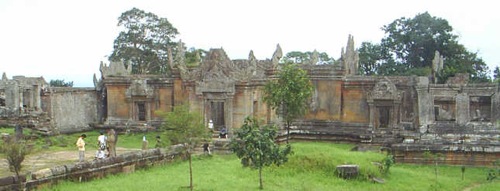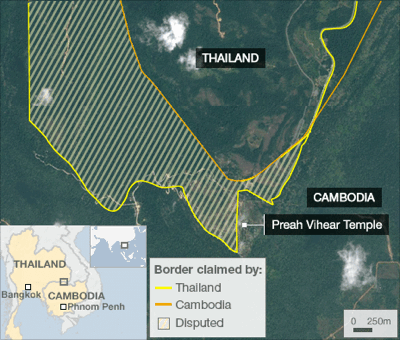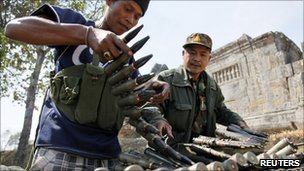Cambodia watchers might like to have a look.
Tag: cambodia

The AP says:
Defense Secretary Leon Panetta said Friday that the U.S. would participate in three Southeast Asian military exercises next year.
Panetta was in Cambodia for talks with his counterparts from 10 Southeast Asian nations in advance of President Barack Obama’s visit next week.
The defense chief said the exercises will be a humanitarian and disaster relief exercise hosted by Brunei; a counterterrorism exercise co-sponsored by the US and Indonesia; and a maritime security exercise led by Malaysia and Australia.
The New York Times reports:
The United States on Friday reaffirmed its military ties with the authoritarian government of Prime Minister Hun Sen of Cambodia, a former Khmer Rouge commander, but Defense Secretary Leon E. Panetta also warned the country about its long record of human rights abuses.
An American Forces Press Service item is here. And a story from VOA is here.
I wanted to point out a few stories ahead of President Obama’s upcoming Southeast Asia trip.
Obama will be Thailand, Myanmar (Burma), and Cambodia from Saturday November 17 through Tuesday November 20.
The U.S. Embassy in Bangkok provides details on Obama’s itinerary:
In Thailand, he will meet with Prime Minister Yingluck to mark 180 years of diplomatic relations and reaffirm the strength of our alliance. In Burma, the President will meet with President Thein Sein and Aung San Suu Kyi and speak to civil society to encourage Burma’s ongoing democratic transition. In Cambodia, the President will attend the East Asia Summit and meet with the leaders of the Association of Southeast Asian Nations.
The Bangkok Post says:
Despite the 12-hour time difference between Washington DC and Bangkok, US President Barack Obama will not even set foot in his hotel until after the day’s business here is finished.
The US president will arrive on Sunday afternoon at Don Mueang airport and travel directly to the Grand Palace where US Secretary of State Hillary Clinton will be waiting for him, a city police source said.
They will travel on to Siriraj Hospital where they will have an audience with His Majesty the King, the source added.
Mr Obama would then travel to Government House to have dinner with Prime Minister Yingluck Shinawatra, said the source, adding that after the dinner, he would have a meeting with about 600 US embassy staff at Chulalongkorn University’s sports complex.
At the end of the day, Mr Obama would check in at the Four Seasons Hotel on Ratchaprasong Road.
Obama will speak at Yangon University on Monday, according to the The New York Times.
The scars of military rule run deep at Yangon University — decrepit buildings, broken sidewalks and mold everywhere. But with plans for President Obama to visit on Monday, hundreds of workers have converged in an urgent effort to spruce up the campus. Mr. Obama’s trip to Myanmar will be the first by an American president, and the authorities are creating something of a Potemkin campus to greet him.
Meanwhile, and an op-ed in today’s Times by Bill Richardson and Mickey Bergman surveys political reforms in Myanmar:
After meeting with an array of leaders in Myanmar, we believe that Thein Sein is committed to transitioning to democracy. But the jury is still out on whether the reform effort will succeed. This is not a revolution like we’ve seen in Middle East countries during the last two years. This is a calculated and contained process — a reform movement from within. On the one hand, it has to be slow and deliberate to allow for governing capacity to be built, as well as to prevent those who prefer the status quo from blocking change, and to keep oligarchs from seizing control and plundering Myanmar’s abundant natural resources. On the other hand, it does need to move quickly so that the population will feel the benefits of reform. Success will rely heavily on full engagement and investment from abroad.
And Lewis M. Simons writes in an op-ed about Obama’s “Asian-style diplomacy”:
As President Obama heads to Myanmar, Cambodia and Laos this week and next, intent on reversing China’s drive to tighten its grasp on Southeast Asia, he is exercising an uncannily Asian-style diplomacy.
By moving calmly into China’s backyard, without threats or in-your-face muscularity, he is proving himself adept at playing by Asian rules. How subtle of him. And smart.
On the subject of Cambodia and Hun Sen, Mark McDonald writes in the IHT:
President Barack Obama and Secretary of State Hillary Rodham Clinton will visit Southeast Asia this week, promoting American commercial interests in Singapore, reinforcing the U.S. military alliance with Thailand and putting the presidential imprimatur on democratic reforms in Myanmar.
But their stop in Cambodia for a regional summit meeting next week will be diplomatically stickier: Photo opportunities with Hun Sen, the authoritarian prime minister of Cambodia, will be hard to avoid.
Economist on Thaksin and Hun Sen
Following my recent post on Thaksin’s Songkran rally next door in Cambodia, I wanted to point out a related Economist piece.
The story examines the exiled former Thai prime minister’s relationship with Cambodia’s PM, Hun Sen:
As much as the rally was a testament to Mr Thaksin’s popularity, it was perhaps even more a reflection of the unusual friendship that has burgeoned between him and Mr Hun Sen over the past few years. At a cost that the Cambodian government has refused to disclose, thousands of its security officers were deployed along with hundreds of support staff including street sweepers, electrical engineers, health workers and many more besides. While much of Cambodia had been shut down over the weekend to celebrate the Khmer New Year, which took place Friday, the authorities in Siem Reap went into overdrive.
Read the whole thing.

There’s news today from the U.N.’s International Court of Justice on the Preah Vihear temple. The BBC says:
The UN’s highest court has ordered Thailand and Cambodia to withdraw troops from a disputed border region near an ancient temple complex.
And:
The court said both sides must allow access to observers from the regional bloc Asean.
The AP reports:
The court drew a “provisional demilitarized zone” around the 1,000-year-old Preah Vihear temple that would push Thai troops back from positions they have long occupied and would see Cambodian armed forces leave the temple’s immediate vicinity.
Meanwhile, here is an ICJ press release (PDF) on the ruling.
How will the news affect Thailand’s domestic politics? (Or politics within Cambodia, for that matter?) That’s still unclear.
Before the ruling, the Bangkok Post reported that:
There will not be any immediate troop withdrawal from the disputed area around Preah Vihear temple, regardless of the decision due today from the International Court of Justice, Army Region 2 spokesman Prawit Hukaew said on Monday.
(Emphasis mine.)
For more on the issue, see the Preah Vihear tag.
(Image: Wikipedia.)
The AP reported yesterday that:
Thailand’s prime minister on Sunday defended his country’s decision to quit the U.N.’s World Heritage Convention, saying its committee’s consideration of a Cambodian plan to manage a protected temple on Thailand’s border would increase tensions.
The UNESCO Web site has this statement yesterday from the Director General, who says:
Contrary to widely circulated media reports, the World Heritage Committee did not discuss the Management Plan of the Temple of Preah Vihear nor did it request for any reports to be submitted on its state of conservation. Moreover, it needs to be clarified that UNESCO’s World Heritage Centre never pushed for a discussion of the Management Plan by the Committee.
And:
The World Heritage Committee decision was adopted unanimously after Thailand staged a walkout. The request of Thailand to adjourn the debate was not supported by any other member of the World Heritage Committee.
Meanwhile, the official MCOT news agency says:
Thailand’s withdrawal from the World Heritage Convention and World Heritage Committee (WHC) is in accordance with his Cabinet’s resolution, because ambiguity in the Cambodian draft resolution is unacceptable, said Prime Minister Abhisit Vejjajiva on Sunday.
Before going to the northeastern province of Ubon Ratchathani for the Democrat Party’s election campaign, Mr Abhisit said that he spoke many times on Saturday regarding this issue with the head of Thai delegates to the WHC meeting in Paris, Natural Resources and Environment Minister Suwit Khunkitti, and Foreign Minister Kasit Piromya.
The draft resolution proposed by Cambodia has ambiguous words which are unacceptable, therefore Thailand decided to pull out of the WHC, he said.
NYT on status of Khmer Rouge tribunal
The New York Times has a story noting that:
As it prepares to open its most complex and significant case, a U.N.-backed Cambodian tribunal trying former Khmer Rouge leaders has been torn by conflict over what critics are calling interference by the Cambodian government and inaction by the United Nations.
Read the whole thing.

A few more items to pass along:
- NY Times: Pause in Fighting Over Temple Between Thailand and Cambodia
- Analysis from Pavin Chachavalpongpun in today’s WSJ: Thailand’s Rising Nationalism
- NBC News World Blog: High farce at the Thai-Cambodian border
- BBC News: Emotional fall-out of Thailand-Cambodia clashes
(Image: BBC News.)

AP: Thai, Cambodian clashes resume at disputed border
Economist blog post with background info and political implications: Shells fly around the temple
BBC: Cambodia nationalism fired by temple row with Thailand
MCOT: Fresh fighting on Thai-Cambodian border; 15,000 evacuated
(Image: Reuters/BBC.)
Yesterday’s NYT: “Cambodia Asks U.N. to Act Amid Clashes With Thailand.”
Also see this Reuters Q&A from Feb. 4: “Preah Vihear temple and Thai-Cambodian tensions.”